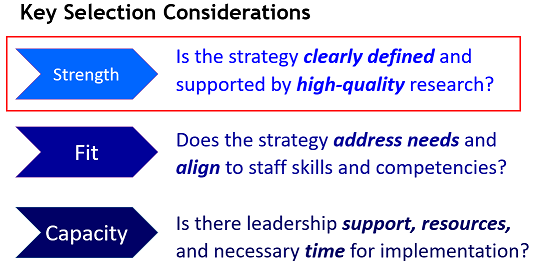NEW! Recorded in December 2019, Federal Programs Unit staff discuss useful K-12 education research clearinghouses, how to navigate What Works Clearinghouse (WWC), and considerations regarding ESSA and evidence strength: Exploring Solutions Webinar and PowerPoint
NEW! Recorded in December 2019, Federal Programs Unit Senior Consultant Jeremy Meredith discusses how to effectively describe and provide citations of EBIs to meet key state and federal planning and grant application requirements: Documenting Solutions Webinar and PowerPoint
The Every Student Succeeds Act (ESSA) defines evidence-based interventions (EBIs) as an activity, strategy, or intervention that demonstrates a statistically significant effect on improving student outcomes or other relevant outcomes. To determine whether an intervention meets this definition, strength of evidence must be assessed. This page offers guidance on how to assess strength of evidence – the first selection consideration when exploring EBIs.
Guiding Questions
To assess strength of evidence, it is important to consult research findings. When reviewing relevant research, guiding questions (listed below) regarding core components, quality of study, and findings should be considered. Clearly describing what the intervention is, the basic study design, population of students in the study, and the findings are recommended first steps for examining evidence strength.
- Core Components – the unique elements which comprise the intervention
- Are key components of the intervention clearly defined?
- Quality of Study – the rigor of study design and implementation
- What population of students were included in the study?
- Was there a comparison group?
- Were experiment and control groups randomly selected?
- Is the study a summary of other findings, i.e., a metastudy?
- Study Findings – the results of the study
- Was there a positive impact?
- Was the impact significant?
- Which population, e.g., students, benefited most?
Research Clearinghouses
Several existing resources are available for determining whether an intervention is supported by high-quality research and assess evidence strength. Research clearinghouses that organize PK - 12 education research findings in one place have been developed for this purpose.
Clearinghouses are online collections of research studies that gauge the evidence strength of interventions. These platforms provide easy access to research findings in simple language. Most clearinghouses set a high standard for inclusion; studies that lack methodological rigor are excluded. Clearinghouses share all available research findings – e.g., positive, neutral, negative. Study results that are neutral or negative are included because it is equally important to know what does –and doesn’t—work.
PK-12 Education research clearinghouses include:
- Results First Clearinghouse Database – This database, developed by PEW Charitable Trust, is an online resource that brings together information on the effectiveness of social policy programs from nine national clearinghouses – a one-stop shop for evidence-based studies.
- Evidence for ESSA – This website curates math and reading interventions which have been shown to have significant statistical impact on student learning.
- What Works Clearinghouse – The WWC has been around for many years and includes a comprehensive collection of studies. It’s curated by the Institute for Educational Sciences, a federally funded project. Here is a video guide to the WWC: https://ies.ed.gov/ncee/wwc/Multimedia/27
- Middle School Matters – This clearinghouse provides decades of high-quality research results focused on middle grade schools across the nation, with particular focus on instructional practices.
- Doing What Works Library – DWW content is based on research reviews conducted or endorsed by the Institute of Education Sciences, usually practice guides.
- Education Resources Information Center (ERIC) -- ERIC is a free, online library of education research, sponsored by the Institute of Education Sciences (IES) of the U.S. Department of Education. It includes abstracts of studies and full-text documents.
- Campbell Collaboration – This website provides access to reviews and research syntheses to support evidence-based decision- and policy-making.
- Blueprints for Healthy Youth Development -- This website provides a registry of evidence-based youth development programs designed to promote the health and well-being of children and teens. Programs in the registry are family-, school-, and/or community-based.
For technical assistance on assessing evidence strength and exploring research clearinghouses, contact:
Anna Rowan
ESEA Program Evaluator and Lead Research Analyst
720-215-7456
Send an email




Connect With Us





